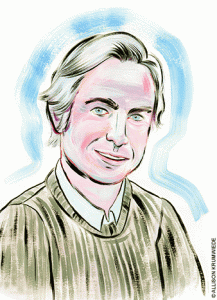 Richard Dawkins was talking about his favorite music. The world’s best-known evolutionary biologist was holding a Q&A session hosted by the Philomathean Society, and conversation had drifted toward his best-loved tunes, which range from works by J.S. Bach to those of American singer-songwriter Judy Collins.
Richard Dawkins was talking about his favorite music. The world’s best-known evolutionary biologist was holding a Q&A session hosted by the Philomathean Society, and conversation had drifted toward his best-loved tunes, which range from works by J.S. Bach to those of American singer-songwriter Judy Collins.
But wasn’t Bach inspired by religion, one student asked the outspoken atheist. Could Bach have existed without religion?
“That’s just what people wrote about in those days,” Dawkins replied. “Imagine Beethoven’s Cretaceous Symphony. Imagine what Michelangelo would have come up with if he were asked to put up something about the universe.”
It seemed like Dawkins was everywhere this March. Or at least everywhere at Penn.
Before the Q&A session, he was at Irvine auditorium, where he spoke at the Philomathean Society’s Annual Oration and received the prestigious Wilton Krogman Award for Achievement in Biological Anthropology. Before that, he was at the Penn Museum, touring exhibits on human evolution and race.
And it seemed like everybody wanted a piece of him. The 1,500 free tickets to his speech at Irvine were gone within three days—and more than 200 people lined up the day of the event in a bid for entry. Even after he left Philadelphia, Dawkins was being discussed: at one panel about religion hosted by Philo, the University Chaplain, and PRISM (Penn’s interfaith student group); and another hosted by the Penn Faculty-Staff Christian Forum.
“How many times have speakers come and gone from Irvine Auditorium?” says Paul Mitchell, a senior philosophy and anthropology major who will graduate this month with a master’s in biological anthropology, who organized Dawkins’ visit to Penn. “We wanted someone who was going to provoke conversations.”
Mission accomplished. At Irvine the celebrated scientist, who pioneered the gene-centric view of evolution, spoke primarily about his new book for young adults: The Magic of Reality: How We Know What’s Really True.
The universe “doesn’t know or care about your existence,” Dawkins began, using a chapter titled “Why Bad Things Happen” as a jumping-off point. But neither, he added, is it out to get you.
Dawkins also offered his thoughts about the concept of proof—which has been the organizing principle of much extracurricular programming this year, in line with the Provost’s Office’s “Year of Proof” theme for 2012-13. Perhaps surprising students who associate proof with empiricism, Dawkins laid out an explanation of proof grounded in the sine qua non of evolutionary biology: deductive logic.
“Proof is the mathematician’s method of reductio ad absurdum,” he said, a way to reason from general premises to produce conclusions that (assuming the truth of the premises) are necessarily true.
By way of example, Dawkins proved, using evolution as a basis, that every single human had to have a single fish ancestor: “My fish had to have been your fish.”
To prove something, Dawkins explained, you don’t need empirical evidence. “There is empirical genetic evidence that a woman did live in Africa something over a 100,000 years ago who gave us all our mitochondria,” Dawkins said, referring to the power-producing organelles within animal cells. But one could deduce that she had to exist. An animal’s mitochondria are inherited exclusively from its mother, so “it is logically necessary that there had to be such a woman” from whom all living humans are descended.
“The truth has a magic of its own,” Dawkins said. “The truth is more magical than any myth.”
That, of course, is an opinion that stands outside the laws of logic or proof. “Some people agreed,” Mitchell reflected after Dawkins’ visit. “Quite a few people disagreed, in varying degrees.
“Good,” he added. “We weren’t looking to persuade people. We were looking to start a conversation.”
—Maanvi Singh C’13

